EUROSTUDY
enquire@eurostudy.co.jp
Just choose your desired course. Let us take care of the rest for you.
5/5 on TrustPilot
5/5 on Google
5/5 on Facebook
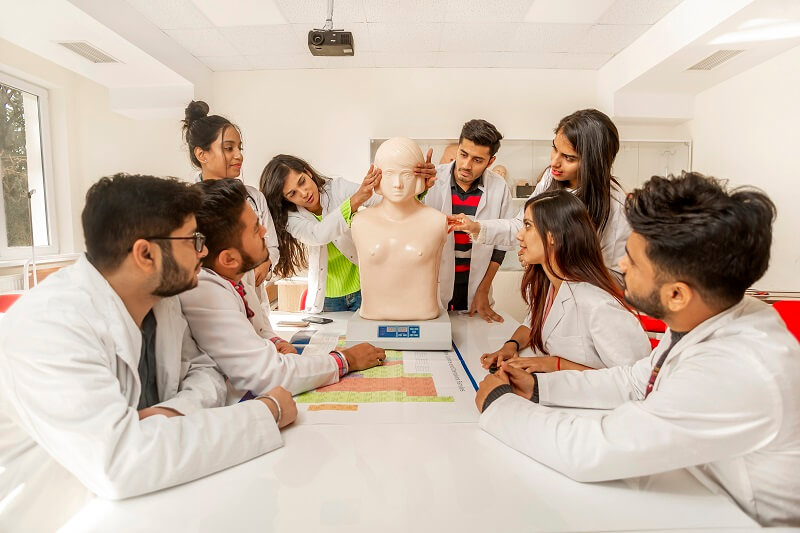
Why Pursue Your Medical Education In Europe?
Globally
Recognised Courses
English
Taught Programs
Flexible
Admission Requirements
Affordable
Tuition Fees, Living Costs
Unlimited
University Applications
Less
Competition For Entry
Modern
Facilities & Technology
Work
Return Home, Start Practicing
Studying medicine abroad expands students’ horizons both in an educational and cultural sense. Furthermore, aspiring doctors acquire self-reliance, discipline, and maturity as part of living in a foreign country. Consequently, international students gain a competitive edge in the job market thanks to their distinct backgrounds and skill sets.
For the past 20 years, it has become increasingly popular for aspiring doctors to study medicine in Europe in English. For some, the life-changing decision to study medicine abroad is the highly competitive admission requirements in their home countries. Other applicants meet the entry criteria but are forced to seek medical education in Europe because it’s more affordable.
Whatever your case, studying medicine in Europe should not be looked down upon or considered an alternative career pathway. The truth is that medical schools overseas offer the same high-quality education and facilities and are recognised by health organisations worldwide. This means you will be eligible for a career in medicine anywhere in the world.
The European universities that teach medicine in English are located in over 40 countries. Each of these universities has its own unique set of entry requirements. The only criterion of acceptance they all share is English language proficiency.
Other than that, you may have to sit an entrance exam in Biology, Chemistry, Physics, or Mathematics. Some exams will be simple multiple-choice questions, while others can be open questions or a combination of both. They may or may not consider your high-school science subjects grades.
There are hundreds of medical universities abroad, so entry requirements will always vary. The most common entry requirements for medicine in Europe are:
Whether you meet the entry requirements for medicine abroad, we can always guarantee entry into medicine or dentistry in Europe. Contact us, tell us what you are looking for in terms of medical education, and we will give you free options tailored to your preferences.
Depending on which country you choose to study medicine abroad, annual tuition fees can range from €3,000 to €30,000. These prices depend solely on the economic state of the corresponding country. More expensive options don't mean better quality of education because medicine is taught and learned the same everywhere.
Here are the general guidelines for the cost of studying medicine in Europe:
For a complete price comparison, check out our extensive list of medical universities in Europe. You can find detailed information about countries, programmes, tuition fees, living costs, curricula, and much more.
Meanwhile, here are the Top 5 universities to study medicine abroad at a low cost:
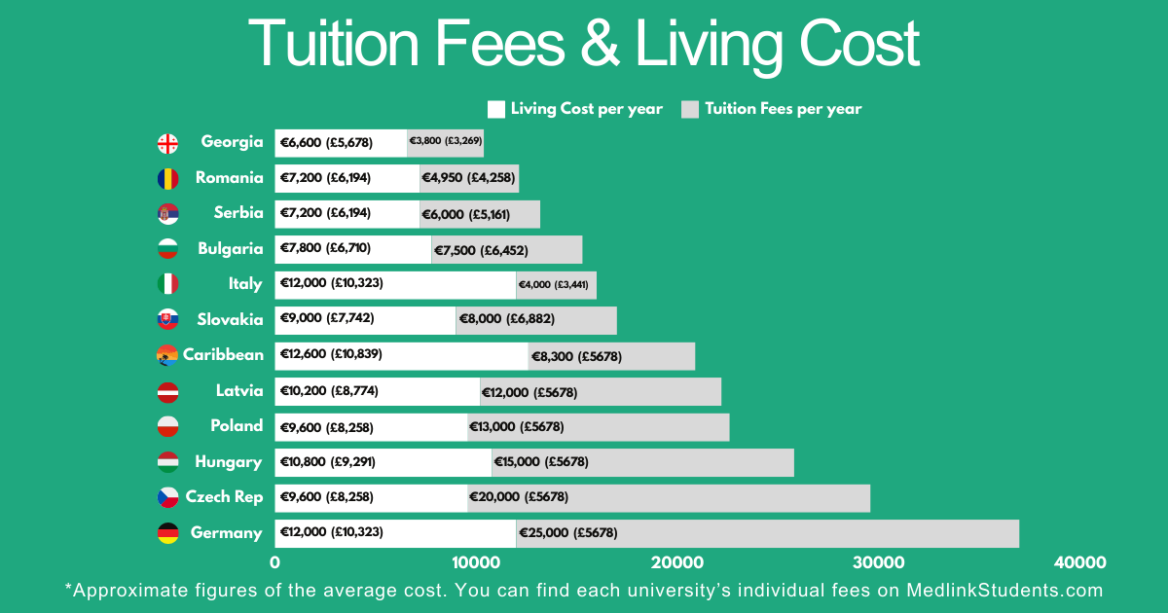
All of our partner universities are recognised by the World Health Organisation and listed in the World Directory of Medical Schools, which in most cases, is a primary degree recognition requirement.
Other common requirements include a course duration of at least 5,500 contact clock hours of study over a period of at least 3 or 4 years.
Medical degrees obtained from a European school will be recognised by the major medical councils worldwide. We've thoroughly researched and vetted these universities to ensure they comply with the best teaching quality standards. Graduates will be eligible to apply for a Doctor's licence in the country of their choice.
For example, you will be eligible to take the USMLE for the USA, the MCCQE for Canada, the PLAB/UKLMA for the UK, the PRES for Ireland, and the AMC clinical examination for Australia.

The majority of universities in Europe have Biology and Chemistry entrance exams as part of their admission requirements. There are, however, several which require no entrance exams:
You might have scored low on your entrance exam in your home country. Or perhaps you couldn’t afford the inflated tuition fees universities require nowadays. Don’t fret because beyond your home country lie excellent education opportunities for you to grasp in Europe.
There are countless reasons why one should consider studying medicine in Europe. It’s not only about the financial side of things or your state’s strict regulations and protocol. Europe is rich in diverse nationalities with their own cultures but also different educational systems. So, in addition to pursuing your dream of becoming a physician, you have a perfect “excuse” to explore the world!
We are leaving the exploration part for you, and we will now outline the top reasons why you should choose to study medicine abroad in English.
The medical degree you get when you graduate from a European university is recognised by the World Health Organisation and Medical Councils worldwide, including in the UK, USA, Canada, Ireland, Australia, the Middle East, Western Europe, and more. This automatically enables you to practise as a doctor in your home country or anywhere in the world.
There are hundreds of leading medical schools in Europe that teach in English and are open to international students. You will rarely see a reputable university that doesn’t have an English programme. This means you have the complete freedom to choose your desired destination according to your specific requirements.
Having an abundance of options to pursue medical education in Europe means that there will be less competition for entry. You will be in a different bracket where you will not compete for places with the local applicants.
You can apply for an unlimited number of medical schools abroad simultaneously, while in the UK, for example, you can only apply for a maximum of 4 at a time. Should you not get accepted into any of them, you would have to wait a year before trying again.
There’s no equivalent to the UMCAT, GAMSAT, BMAT, or any other irrelevant and complicated exam in Europe, so those are out of the list. You are only required to pass an entry test in Biology and Chemistry and a simple interview to evaluate your motivation to enter the world of medicine.
In many European universities, you can enroll in medicine without having to go through the hassle of an entrance exam. The European University of Tbilisi in Georgia is a brilliant example.
Tuition fees in most European countries, especially in Eastern Europe, are significantly lower than those of Western Europe or North America. For example, you can find a university in Georgia that charges €5,250 per year, or one that will cost you €8,500-€9,000 per year in Romania or Bulgaria.
Bear in mind that the lower tuition fees DO NOT compromise the quality of education. Prices are determined based on geographical and economic factors and have nothing to do with your studies.
This is also why the cost of living in Europe is lower, and your living expenses will hardly ever exceed €300 – €600 per month.
European medical universities that offer English-taught programmes have already established international student communities from the UK, the US, Canada, the Middle East, Germany, and many more. We assure you that you will not feel alone on this journey, and you will also have us to guide your every step and support you.
Overseas modern medical facilities teach with top-notch technology, have rich medical libraries that you can access anytime, fully equipped laboratories, university teaching hospitals, and much more.
Since your medical degree will be recognised worldwide, you will be able to return home and practise your dream profession right away.
A wide variety of universities in Europe teach medicine in English, distributed between over 40 countries. Each of these universities has its own unique set of entry requirements. The only criterion of acceptance they all share is English language proficiency.
Other than that, you may have to sit an entrance exam in Biology, Chemistry, Physics, or Mathematics. Some exams will be simple multiple-choice questions, while others can be open questions or a combination of both. They may or may not consider your high-school science subjects grades.
Certain universities may interview applicants to evaluate their motivation to study medicine.
Request a FREE consultation with one of our expert advisors. They will be able to give you tailored advice on universities, living abroad, and much more.
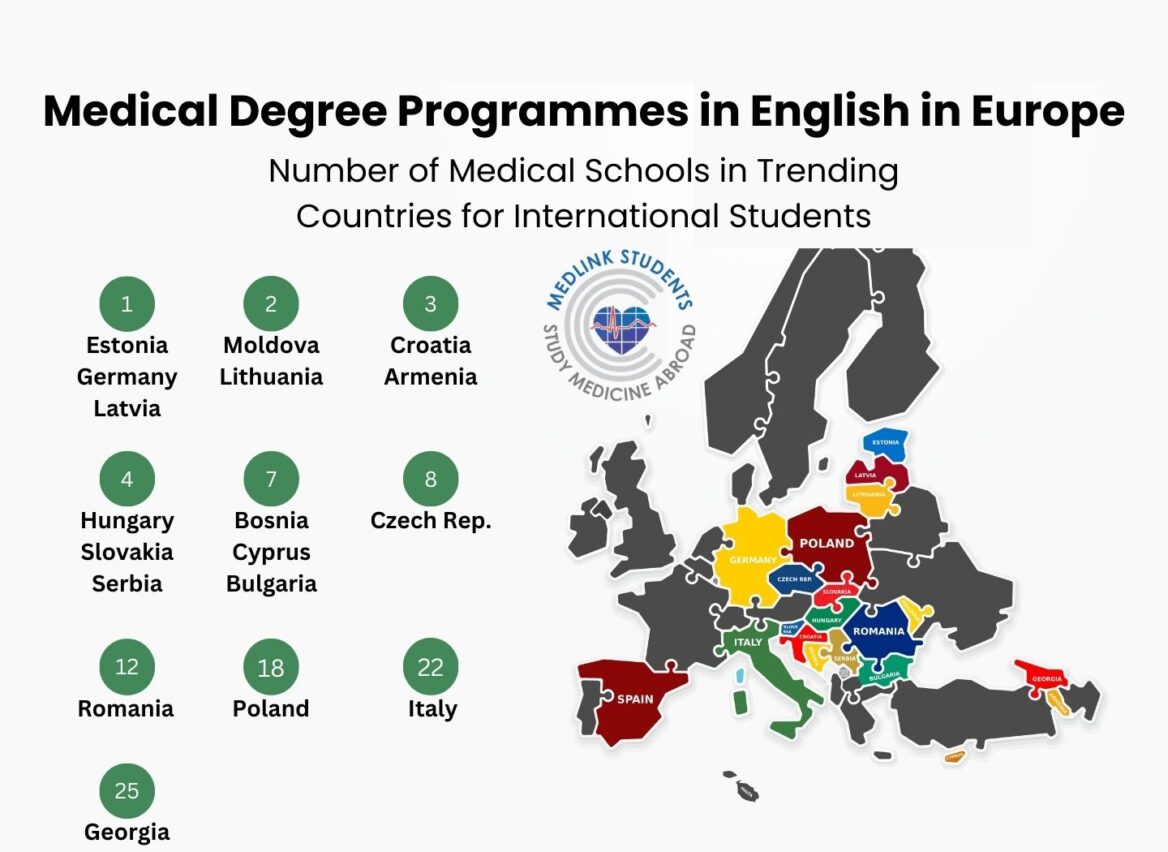
There are more than 100 medical schools in Europe where you can study medicine in English. Some of the most popular destinations are Georgia, Bulgaria, Romania, Serbia, and Poland.
For detailed reviews and information on the best medical universities in these countries, you can check our universities page.
There you will find an extensive, ever-expanding list of prestigious universities with their yearly tuition fees and courses. Alternatively, you can skip hours of research and contact a Medlink Students advisor to consult you on your options for FREE.
Medical courses in Europe are aimed at fresh high school graduates who can apply right after their GCSEs, A-levels, or the 12 grade equivalent of countries worldwide. Medical schools abroad offer English-taught programmes and have dedicated places for international students each year.
There is no need to take a gap year, gain experience, or shadow a doctor before applying. European medical schools will accept you right away as long as you meet the admission requirements.
English taught Medicine in Europe takes 6 years to graduate. The course includes 3 years of theoretical subjects and 3 years of practical knowledge and experience. The academic studies include subjects such as Anatomy and Pathology, the building blocks of the profession.
These are necessary for proceeding to the next stage of your education - applying your knowledge in practical training sessions and interactions with patients in hospitals, also known as clinical rotations.
The course sizes in Europe usually range from around 50-200 students depending on which university you choose. You’ll typically study in small groups of about ten for seminars, so you will get many opportunities to learn and practise your skills.
You will graduate as a Doctor of Medicine. Moreover, you will be able to start working in hospitals as a junior doctor right away.
The top 10 medical universities in Europe that teach in English are:
Studying medicine abroad is a relatively straightforward process, though this doesn’t make it any easier. Here is a step-by-step guide to achieving your educational dreams:
In 2020, we introduced the online medical course for years 1 to 3 in collaboration with our partner universities. You can study pre-clinical subjects of medicine from the comfort of your home with the option to switch to physical attendance anytime.
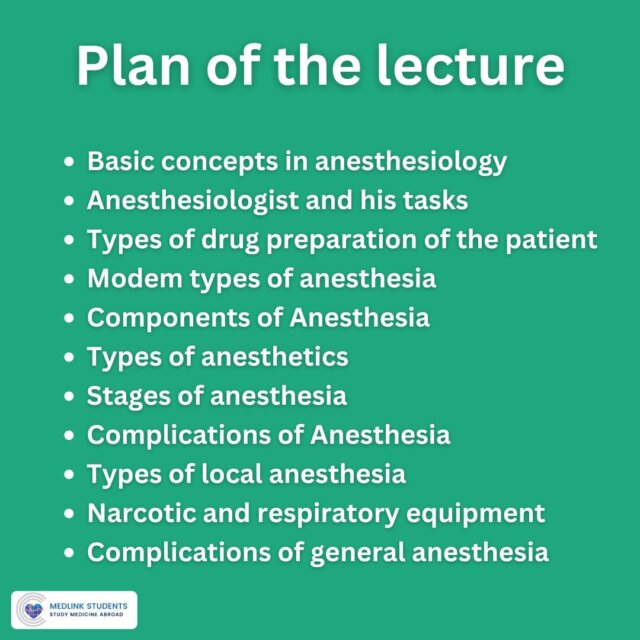
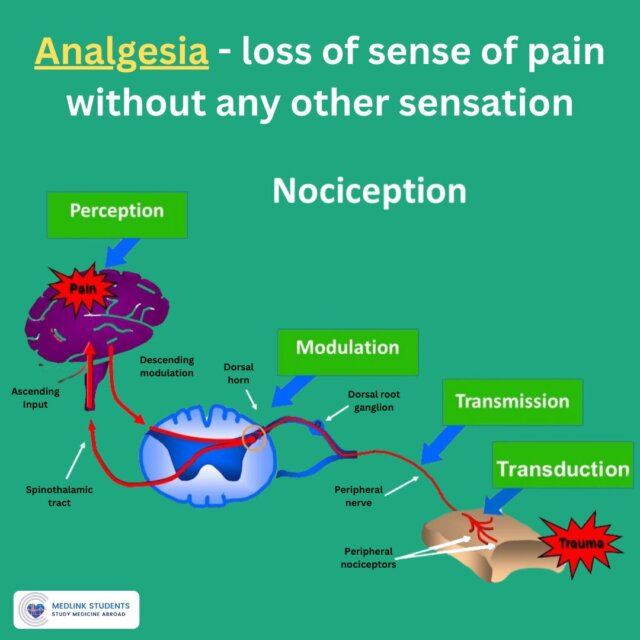
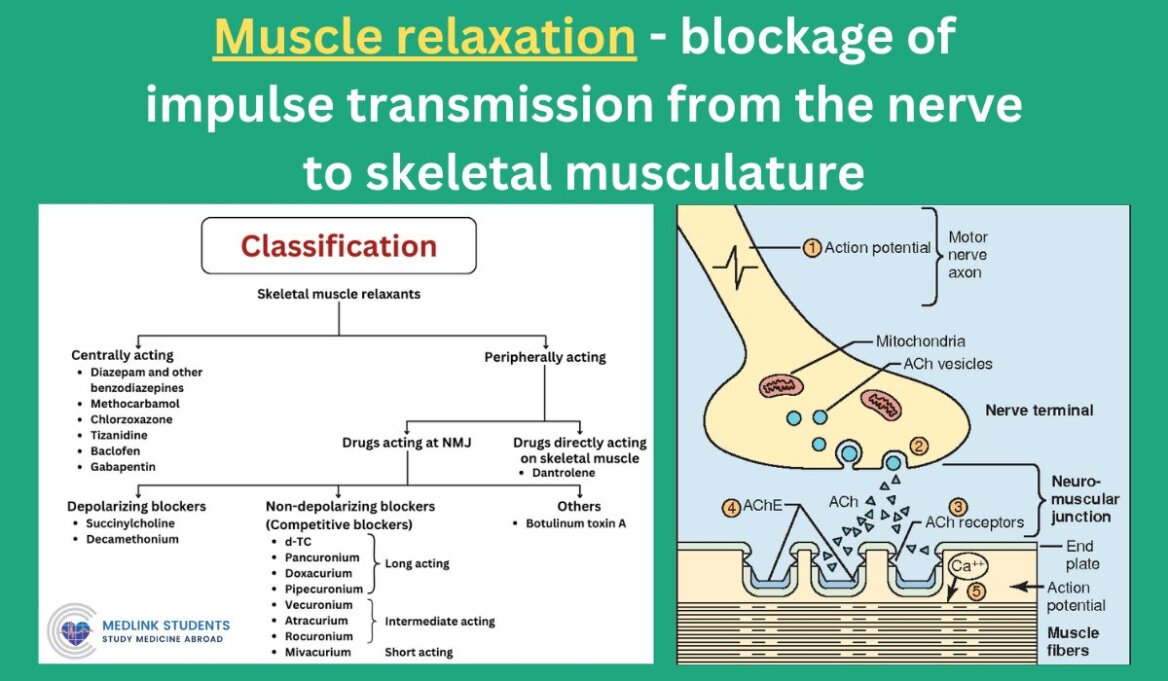
There are numerous accelerated routes for students who have studied science or health-related disciplines at the undergraduate level. Students are eligible to enter a fast-track graduate-entry dentistry or graduate entry medicine route in Europe if they hold any type of higher education diploma.
These options are usually 4 or 5 years long and depend on previous qualifications and subjects studied there. Most students who apply for the graduate entry pathway have studied Biomedical Sciences, nursing or any similar programme.
Medlink Students is the leading international agency for studying medicine abroad in Europe. Thousands of students trust us each year with professional advice, handing their documents, and helping them secure a seat at top universities overseas.
Whether you’re an undergraduate student or a bachelor’s degree holder, you can schedule a call with one of our expert advisors. We will not charge you for the assessment of your documents and the consultation. The tailored advice you will get is based on your preferences about countries, universities, tuition fees, accreditation, accommodation, leisure time, and other criteria.
We collaborate closely with all our partner universities, so any claims we make will be firm. We promise 100% guaranteed admission into a medicine course abroad.
Medlink Students' comprehensive service has over 30 contractual obligations, including:
Schedule a FREE consultation now to discover your options in Medicine.